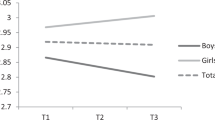Abstract
The purpose of this study was to examine the personological features of moral judgment and to determine the extent to which principled moral reasoning is politically biased. We also attempted to determine the relation between moral judgment and attitude to authority and the developmental patterning of attitude to authority from early to late adolescence. Attitude to authority was assessed in terms of specific sources of authority (mother, father, police, government) and by the Attitude to Authority Scale, which assesses attitudes along the liberal-conservative political continuum. The conservative personality syndrome was assessed by the Conservatism Scale, while moral judgment was assessed by the Defining Issues Test. The results indicated that moral reasoning is unrelated to attitudes to specific sources of authority and negatively related to political conservatism and to conservative personality features. Attitudes toward sources of personal authority (mother, father) were more similar than attitudes toward impersonal authority (police, government), though attitudes toward Father were related to attitudes toward Government and Police. Age trends showed that younger adolescents are more politically conservative and more conforming to authority than older adolescents. Results are discussed in terms of the political and personological features of Kohlbergian moral judgment and in light of recent research on the transformation of adolescent-parent relations in adolescence.
Similar content being viewed by others
References
Anderson, C. A. (1962). A developmental study of dogmatism during adolescence with reference to sex differences.J. Abnorm. Soc. Psychol. 65: 132–135.
Bagley, C. (1970). Racial prejudice and the “conservative” personality: A British sample.Polit. Stud. 18: 134–141.
Baranowski, M. (1981). Adolescents' attempted influence on parental behaviors.Adolescence 13: 585–603.
Boshier, R. (1969). A study of the relationship between self-concept and conservatism.J. Soc. Psychol. 33: 139–141.
Coleman, J. C. (1980). Friendship and the peer group in adolescence. In Adelson, J. (ed.),Handbook of Adolescent Psychology, John Wiley and Sons, New York.
Enright, R., and Lapsley, D. (1981). Judging others who hold opposite beliefs: The development of belief-discrepancy reasoning.Child Dev. 52: 1053–1063.
Enright, R., Roberts, P., and Lapsley, D. (1983). Belief discrepancy reasoning in the elderly.Int. J. Aging Hum. Dev. 17: 213–221.
Enright, R., Lapsley, D., Franklin, C., and Steuck, K. (1984). Longitudinal and cross-cultural validation of the belief-discrepancy reasoning construct.Dev. Psychol. 20: 143–149.
Eysenck, H. J. (1973). Foreword. In Wilson, G. (ed.),The Psychology of Conservatism, Academic Press, London.
Hunter, F., and Youniss, J. (1982). Changes in the functions of three relations during adolescence.Dev. Psychol. 18: 806–811.
Johnson, J., Hogan, R., Zonderman, A., Callens, C., and Rogolsky, S. (1981). Moral judgment, personality, and attitudes toward authority.J. Personal. Soc. Psychol. 40: 370–373.
Kirk, R. (1968).Experimental Design: Procedures for the Behavioral Sciences, Brooks/Cole, Belmont, Calif.
Lapsley, D., and Enright, R. (1979). The effects of social desirability, intelligence, and milieu on an American validation of the Conservatism Scale.J. Soc. Psychol. 107: 9–14.
Lehmann, I. (1963). Changes in critical thinking, attitudes, and values from freshman to senior years.J. Educ. psychol. 53: 305–315.
Lockwood, A. (1970).Relations of Political and Moral Thought, Unpublished doctoral dissertation, Harvard University, Cambridge, Mass.
Marascuilo, L., and McSweeney, M. (1967). Nonparametric post-hoc comparisons for trend.Psychol. Bull. 67: 401–412.
Pannes, E. (1963). The relationship between self-acceptance and dogmatism on junior-senior high school students.J. Educ. Sociol. 36: 419–426.
Plant, W., and Telford, C. (1966). Changes in personality for groups completing different amounts of college over two years.Genet. Psychol. Monogr. 74: 3–36.
Ray, J. (1971). An “attitude to authority” scale.Austral. Psychol. 6: 31–45.
Rest, J. (1979).Revised Manual for the Defining Issues Test, Minnesota Moral Research Projects, Minneapolis.
Rest, J. (1982).Bibliography of DIT Research, Unpublished manuscript, University of Minnesota, Minneapolis.
Rest, J. (1984). Morality. In Mussen, P. (ed.),Handbook of Child Psychology, 4th ed.,Vol. 3. Cognitive Development, John Wiley & Sons, New York.
Rigby, K., and Rump, E. (1981). Attitudes toward parents and institutional authorities during adolescence.J. Genet. Psychol. 109: 109–118.
Rokeach, M. (1954). The nature and meaning of dogmatism.Psychol. Rev. 61: 194–204.
Simpson, E. (1974). Moral development research: A case study of scientific cultural bias.Hum. Dev. 17: 81–106.
Steinberg, L. (1981). Transformations in family relations at puberty.Dev. Psychol. 17: 833–840.
Sullivan, K., and Sullivan A. (1980). Adolescent-parent separation.Dev. Psychol. 16: 93–99.
Thomas, D. (1975). Conservatism, authoritarianism, and child-rearing practices.Br. J. Soc. Clin. Psychol. 14: 97–98.
Weber, M. (1946). Politics as a vocation. (Originally published, 1921) In Gerth, H., and Mills, C. (eds.),From Max Weber: Essays in Sociology, Oxford University Press, New York.
Wilson, G, (ed.). (1973a).The Psychology of Conservatism, Academic Press, New York.
Wilson, G. (1973b). A dynamic theory of conservatism. In Wilson, G. (ed.),The Psychology of Conservatism, Academic Press, London.
Wilson, G., and Patterson, J. (1968). A new measure of conservatism.Br. J. Soc. Clin. Psychol. 8: 264–269.
Author information
Authors and Affiliations
Rights and permissions
About this article
Cite this article
Lapsley, D.K., Harwell, M.R., Olson, L.M. et al. Moral judgment, personality, and attitude to authority in early and late adolescence. J Youth Adolescence 13, 527–542 (1984). https://doi.org/10.1007/BF02088597
Received:
Accepted:
Issue Date:
DOI: https://doi.org/10.1007/BF02088597




